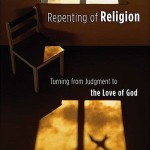We run our website the way we wished the whole internet worked: we provide high quality original content with no ads. We are funded solely by your direct support. Please consider supporting this project.

A Cruciform Dialectic
One of the most important aspects of God’s action on Calvary, I believe, is this: God revealed himself not just by acting toward humans, but by allowing himself to be acted on by humans as well as the fallen Powers. God certainly took the initiative in devising the plan of salvation that included the Son of God becoming human at “the right time” for him to get crucified (Rom 5:6). And God was certainly taking the initiative as Jesus taught and acted in provocative ways that were certain to get him crucified. Hence, Scripture says that part of God’s “deliberate plan and foreknowledge” was to have Jesus handed over (Acts 2:23) to wicked people to do what God’s “power and will had decided beforehand” should be done (Ac 4:28).
At the same time, as active as God was in revealing his nature on Calvary, we must also notice that this revelatory act took place by God allowing wicked humans and forces of evil to act out their wicked and violent intentions against Jesus. Indeed, the physical and verbal assaults Jesus absorbed in the process of being crucified were actually just a microcosm of the sin of the world that Jesus absorbed on the cross, thereby allowing every human throughout history to act on him.
It is within this dialectic of acting and being acted upon that God communicates his true identity, and given that his true identity is humble, self-sacrificial love, it’s hard to see how it could have been otherwise. A deity whose essence was power could reveal himself by unilaterally acting upon others, but not the one true triune God whose eternal existence is an unending act of three divine Persons giving themselves wholly over to one another.
As the biblical narrative attests, and as Calvary makes most explicit, God is a God who humbly makes space for agents whom he has created to possess a degree of autonomous “say-so” in effecting what comes to pass—even to the point that their “say-so” influences, and in limited ways, thwarts, God’s “say-so.” Hence, God’s typical way of working in and through human agents is by means of influence, not coercion. God respects the relative autonomy, personhood and free will of people, to say nothing of angels. And this is, at least in part, why his way of rescuing us from the prison we have placed ourselves in is a slow, gradual, arduous process that involves a great deal of patience and self-sacrifice on God’s part. For the same reason, it is a process that involves God relying on his wisdom rather than merely relying on his power to accomplish his purpose, as the quintessential revelation of God on Calvary makes clear and as Scripture repeatedly stresses.
The cross is thus the full revelation of God’s character precisely because it wasn’t a unilateral action of God toward humans but rather came about, in part, by God humbly allowing human and angelic agents to engage in hostile activity against God. For this same reason, the cross was not merely a revelation of God’s power but also of God’s wisdom. God wisely turned the evil he absorbed into good, including the good of glorifying his Father by revealing his true self-sacrificial character and freeing humans from their oppression to sin and the devil.
Photo via Visual Hunt
Category: General
Tags: Character of God, Cross, Cruciform Theology, Love
Topics: Attributes and Character
Related Reading

Reflections on Divine Violence in the Old Testament
As some of you know, for the last five years I’ve been working on a book addressing the problem of divine violence in the OT. (For alleged violence in the NT, see Thomas R. Yoder Neufeld, Killing Enmity: Violence in the New Testament (Baker Academic, 2011). It will be a highly academic tome, approximately 600…

God’s Dream for the World
One of the grandest expressions of non-violent nature of God is found in Isaiah 11. Here God is dreaming of a time when his creation would be entirely free of violence. “The wolf will live with the lamb,” Isaiah says, and “the leopard will lie down with the goat.” So it will be with “the…

Cross Vision Coming Soon!
In Greg’s new book, Cross Vision, he explains how the crucifixion of Jesus makes sense of the violent portraits of God in the Old Testament. His groundbreaking “cruciform hermeneutic” will change the way that you read the Bible! While Crucifixion of the Warrior God laid out Greg’s case in detail for an academic audience, Cross Vision…

Jesus Did Not Teach Ethical Behavior
Image by a2gemma via Flikr Paul teaches that love is not rude (1 Corinthians 13:4–5). If we forget that the New Testament is about the new life given us in Jesus Christ, we easily misinterpret this passage to be an ethical injunction. We read it saying, “Thou shall not be rude.” So in sincere obedience we set…

Quotes to Chew on: God’s Love When We Rebel
“Despite the fall and its consequent curse, however, God’s love was not deterred. God is love. God doesn’t stop being God simply because the humans he created have rebelled against him. God does not abandon his goal of having others share in the eternal, ecstatic dance of the Father, Son and Holy Spirit. The world…

Do Not Fear
We interrupt this election season to bring you the following reminder: [F]ear is a diabolic force. Its ultimate creator is Satan, and he uses it to keep us in bondage (Heb. 2:15). Throughout history, leaders have used fear to rally the masses around their causes, sometimes getting them to do things they otherwise would never…
